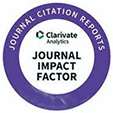SYNTHESIS OF IRON OXIDE-MONTMORILLONITE COMPOSITE AND STUDY OF ITS STRUCTURAL STABILITY AGAINTS SULFURIC ACID
Karna Wijaya(1*), Eko Sugiharto(2), Mudasir Mudasir(3), Iqmal Tahir(4), Ika Liawati(5)
(1) Chemistry Department, Faculty of Mathematics and Natural Sciences, Universitas Gadjah Mada, Yogyakarta
(2) Chemistry Department, Faculty of Mathematics and Natural Sciences, Universitas Gadjah Mada, Yogyakarta
(3) Chemistry Department, Faculty of Mathematics and Natural Sciences, Universitas Gadjah Mada, Yogyakarta
(4) Chemistry Department, Faculty of Mathematics and Natural Sciences, Universitas Gadjah Mada, Yogyakarta
(5) Chemistry Department, Faculty of Mathematics and Natural Sciences, Universitas Gadjah Mada, Yogyakarta
(*) Corresponding Author
Abstract
The synthesis and characterization of iron oxide-montmorillonite and its structural stability test with various concentration of sulfuric acid were conducted. Synthesis was performed by treating Na-montmorillonite clay with oligocations of iron, followed by calcinating the intercalation compound of oligocations-montmorillonite at 200oC for 24 hours. Calcined product was then characterized to determine the iron content, basal spacing and its porosities distribution. To test structural stability againts strong acid (i.e. sulfuric acid), the composites were dispersed into solution of sulfuric acid with various concentration, i.e: 1, 2 and 3M for 24 hours.
The characterization result, especially from x-ray-diffractometry analysis, demonstrated that modification of montmorillonite using iron (III)oxide produced so called house of card structure as indicated by its broad, low intensity reflection at 2θ = 5-6o. The addition of sulphuric acid into composite resulted in probably the formation of face to face arrangements indicated by the appearance of 001 plane reflection. The acid treatment also caused the decrease in the iron content of the iron oxide-montmorillonite as shown by its neutron activated analysis result. The iron content of iron oxide-montmorillonite before the acid treatment was 32,01% w/w, and after the acid treatment was 14.08% w/w (with sulfuric acid of 1M), 6.05% w/w (sulfuric acid of 2M) and 5,98% w/w (with sulfuric acid of 3M), respectively.
In general, the sulphuric acid treatment to the composite did not distore the 001 planes of the montmorillonite.
Keywords
Full Text:
Full Text PdfReferences
[1] Baksh, M.S., Kikkides, E.S. and Yang, R.T., 1992, Ind.Eng.Res, 31, 2181-2189.
[2] Canizares, P., Valverde, J.L. and Sun Kou, M.R., 1999, Microporous and Mesoporous Mater, 29, 267-281.
[3] Ding, Z., Kloprogge, J.T., Frost, R.L., Lu, G.Q. and Zhu, H.Y., 2002, J. Porous Mater, 8, 273-293.
[4] Figueras, F., 1988, Catal.Rev-Sci.Eng., 30, 457-499.
[5] Gil, A. and Montes, M., 1994, Langmuir, 10, 291-297.
[6] Gil, A., Vicente, M.A. and Gandia, L.M., 2000, Microporous and Mesoporous Mater, 34, 115-125.
[7] Huston, N.D., Hoekstra, M.J. and Yang, R.T., 1999, Microporous and Mesoporous Mater, 28, 447-459.
[8] Kumar, P. and Jasra, R.V., 1995, Ind.Eng.Chem.Res., 34, 1440-1448.
[9] Leonard, V.I., 1995, Material Chemistry: An Emerging Discipline, American Chemical Society, Washington.
[10] Long, R.Q. and Yang, R.T., 1999, J.of Catal, 186, 254-268.
[11] Lowell, S. and Shield, J.E., 1983, Powder Surface Area and Porosity, 2nd edition, London.
[12] Pinnavaia, T.J., 1983, Science, 220, 4595.
[13] Riyanto, A., 1994, Bahan Galian Industri, Direktorat Jendral Pertambangan
[14] Umum Pusat Penelitian dan Pembangunan Teknologi Mineral, Bandung.
[15] Widihati, I.A.G., 2002, Sintesis Lempung Montmorilonit Terpilar Fe2O3 and Kajian Sifat-Sifat Kimia Fisiknya, Tesis S2 Pascasarjana, UGM, Yogyakarta.
[16] Wijaya, K., 2000, Lempung Terpilar (Pillared Clay) sebagai Material Multiguna, Eksata, 1, 2.
[17] Yulianto, B., 2001, Mempelajari Sintesis Lempung Terpilar and Uji Stabilitas pilar Terhadap Efek Panas, Skripsi, FMIPA, UGM, Yogyakarta.
[18] Zhu, H.Y., Xia, J.A., Vansant, E.F. and Lu, G.Q., 1997, J.Porous Mater, 4, 17-26.
[19] Zulkarnaen, W.S dan Marmer, D.H., 1990, Pengkajian, Pengolahan dan Pemanfaat Bentonit dari Kecamatan Pule, Kabupaten Trenggalek Propinsi Jawa Timur sebagai Bahan Penyerap Lumpur Bor, Buletin PPTM, 12, 6, Bandung.
Article Metrics
Copyright (c) 2010 Indonesian Journal of Chemistry

This work is licensed under a Creative Commons Attribution-NonCommercial-NoDerivatives 4.0 International License.
Indonesian Journal of Chemistry (ISSN 1411-9420 /e-ISSN 2460-1578) - Chemistry Department, Universitas Gadjah Mada, Indonesia.












